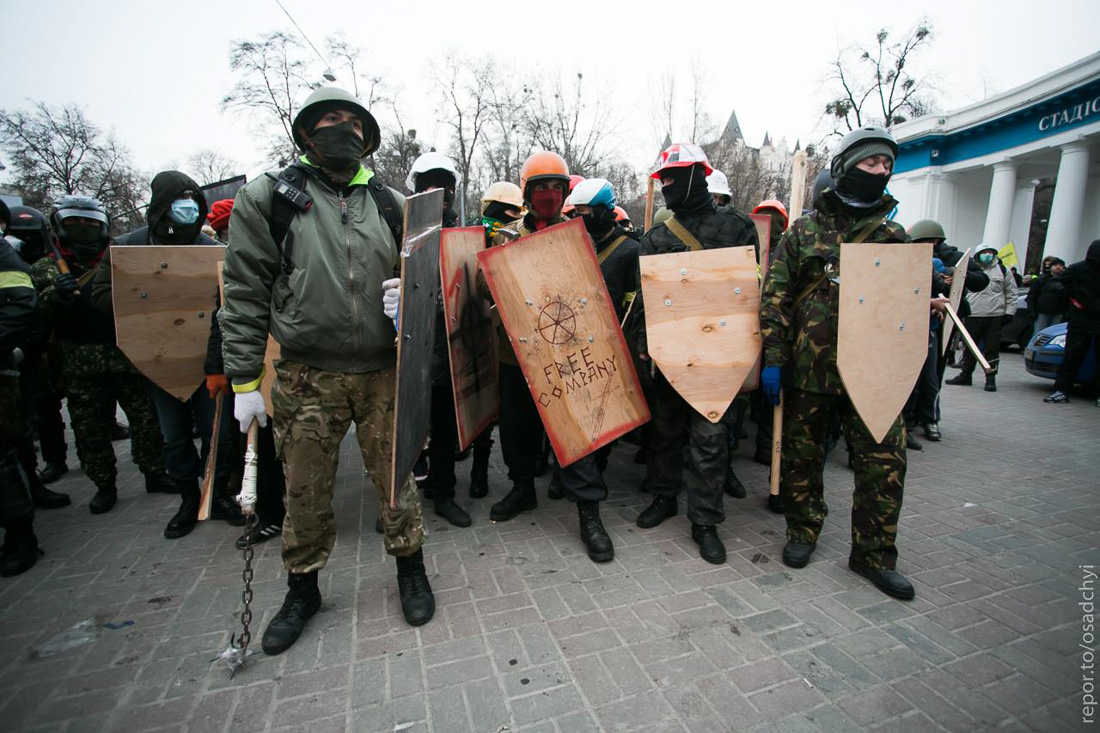Comparative Politics 101: Democratization in Ukraine?
January 23, 2014
0
comments
2678
Views
Add to reader
Print
In
Log in if you are already registered
In the recent days, the post-Soviet world (and beyond) has been transfixed by Ukraine's contentious politics. Is it a beginning of the revolution, which will oust Yanukovych? Or is it a prelude to a wide-scale repression by the "family"? There is no doubt that what is happening in Kiev is about democracy--the rule of the people, in this direct sense. President Viktor Yanukovych has certainly infuriated many European-minded Ukrainians when he postponed the signing of the association agreement with the European Union and relied on Vladimir Putin's "generous" help to fix economic problems. In the hindsight, it can be argued that little had Yanukovych known about the consequences of his actions. A recent poll conducted by the Democratic Initiative Foundation has indicated that 51% of Ukrainians want democracy; only 20% want to live under authoritarianism. In light of this evidence, Viktor Yanukovych is in a shaky position. The people (a majority, indeed) want something that he and his coterie are not. Is Ukraine on its way to democracy or not?

To repress or not to repress? Who to buy off? To liberalize and yield, or crackdown on opposition and civil society? These are the questions that authoritarian leaders have to find an answer to before they lose power or retain it. There is a myriad of social science theories about democratization, which is a study of [how] and, to a lesser extent, [why] countries part ways with authoritarian past. For quite a long period of time, democratization was considered to be a function of economic growth, which is the core premise of modernization theory first introduced by Martin Seymour Lipset. Some social scientists (influenced by Parsons's work) explained democratization in terms of the furtherance of political culture, which accompanies modernization (e.g., Almond and Verba 1963). Although the relationship between economic development and democracy has been the most significant discovery in the field (Rueschemeyer, Stephens, and Stephens 1992), this very fact has little explanatory power. Even the now classic study by Przeworski et al. (2000) discusses democratic survival, but not the process of democratization itself. Neither can it explain why Georgia, given its low GDP per capita levels, managed to sustain democracy, whereas much richer Ukraine failed.

Modernization theory. Source: Acemoglu et al. 2008.
Another strand of comparative politics literature centered around human-agency approach (among others, Rustow 1970; O'Donnell and Schmitter 1986; Di Palma 1990). Until the 2000s, this theoretical school has argued that political change begins with a split between "hard-liners" and "soft-liners" within an authoritarian regime. Though analytically rigorous (hence the widespread use of this framework by political economy scholars), "transitology" does not always fit into political scenarios we may witness these days. In the recent decade, a new kind of literature on transitions emerged, this time with foci on external actors and indigenous forces (Carothers 1999; Bunce and Wolchik 2011; McFaul, Bunce, and Stoner 2011). The most recent of these studies argues that democratic transitions occur when civil society rebels against a regime and faces repression, which is broadcast to the world using independent media and cooperation among the NGOs (McFaul and Stoner 2013). The role of external forces, then, is to support the infrastructure of an opposition during the authoritarian period and to provide diplomatic encouragement during the time of transition. What about external actors that want to nip democracy in the bud?
Why Dr. McFaul and his collaborators' theory has failed in Russia is a topic for another discussion. Yet, Michael McFaul and Kathryn Stoner's theoretical framework is something that can be applied to Ukraine. In their book, the editors (2013: 14) write: "Successful cases [of democratic transitions-my note] usually occurred after indigenous prodemocracy forces rallied the masses against the regime and after indigenous civil society institutions and independent media broadcasted the regime's repression." How can we relate this finding to Ukraine? In fact, this is exactly what is going on in Kiev. Following McFaul and Stoner's logic, we would assume that external response is likely to follow. And sanctions against Yanukovych and his security apparatus are, indeed, being discussed on both sides of the Atlantic. So should we then expect a democratic transition in Ukraine, once and for all? My answer is rather no than yes.

To understand why such an ideal scenario is questionable, we should refer to fascinating research on civil resistance by two security scholars Erica Chenoweth and Maria Stepan (2011) on the logic of nonviolent conflict. Their main statistical finding is that during the period 1940-2006, nonviolent campaigns were twice as more likely to result in a regime change. Violence reduces the chances for a successful outcome, because the payoffs, speaking in economic terms, are mutually exclusive. Either one group dominates over another, or the other way around. Put simply, when violence takes place, the process of democratization can be easily disrupted. It is understandable that progressive Ukrainians do not want to tolerate their regime's repression, but the means of achieving their ends are disputable. By attacking the police, the protesters justified the repression that can be used against them by Yanukovych. My tentative prediction is that the regime will suppress the opposition.
Unfortunately, political science cannot provide us with definitive answers with regard to political change. It could neither predict the collapse of the Soviet Union, nor the outbreak of the Arab Spring, and said nothing about many other political phenomena. Amid that, one thing is clear, however: successful democratization cannot be accomplished without the passion of the citizens to depart from authoritarian rule. No external help or encouragement from Brussels or Washington alike can propel a country towards democracy.In this vein, National Endowment for Democracy's Nadia Diuk argued that Ukraine's civil society is the most critical actor in the country's ongoing democratization processes. Unless there is a consensus among Ukrainians how their country should be ruled, the consolidation of democracy in Ukraine is beyond reach. "If democracy ever comes to Ukraine," Diuk wrote, "it will be the result of the continuing activism of civil society in acting as watchdogs, holding government accountable, providing policy recommendations, and mobilizing and educating citizens to act in their own best interests." It is extensive citizen control and adherence to civil resistance methods--not violence against security forces--that are key to Ukraine's political development toward a brighter future.
References:
Acemoglu, D., Johnson, S., James A. Robinson, and Pierre Yared. 2008. Income and Democracy. American Economic Review, 98(3): 808-42.
Almond, G., and Sydney Verba. 1963. The Civic Culture: Political Attitudes and Democracy in Five Nations. Princeton University Press.
Bunce, V., McFaul, M., and Kathryn Stoner-Weiss (Eds.). 2010. Democracy and Authoritarianism in the postcommunist World. Cambridge University Press.
Bunce, V., and Sharon Wolchik. 2011. Defeating Authoritarian Leaders in postcommunist Countries. Cambridge University Press.
Carothers, T. 1999. Aiding Democracy Abroad: The Learning Curve. Carnegie Endowment for International Peace.
Chenoweth, E., and Maria Stephan. 2011. Why Civil Resistance Works: The Strategic Logic of Nonviolent Conflict. Columbia University Press.
Di Palma, G. 1990. To Craft Democracies: An Essay on Democratic Transitions. Berkeley: University of California Press.
McFaul, M., and Kathryn Stoner (Eds). 2013. Transitions to Democracy. Baltimore: The Johns Hopkins University Press.
O’Donnell, G., and Philippe Schmitter. 1986. Transitions from Authoritarian Rule: Tentative Conclusions about Uncertain Democracies. Baltimore: The Johns Hopkins University Press.
Przeworski, A., Alvarez, M., Cheibub, J., and Fernando Limongi. 2000. Democracy and Development: Political Institutions and Well-Being in the World, 1950-1990. Cambridge University Press.
Rueschemeyer, D., Stephens, E., and J. Stephens. 1992. Capitalist Development and Democracy. University of Chicago Press.
Rustow, D. 1970. Transitions to Democracy: Toward a Dynamic Model. Comparative Politics, 2(3): 337-363.
Share this article
OTHER RECORDS
Why The West Does Not Understand Russia
August 25, 2014
Denis Burakov




